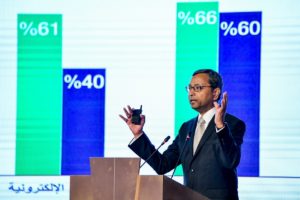Youth In The Middle East Overwhelmingly View Saudi Arabia As A Stronger Ally Than Iran
Young Arabs overwhelmingly view Saudi Arabia as a stronger ally than Iran and believe the Kingdom to be the Arab state that has increased its influence the most in the Middle East in the past five years, according to insights from the 11th annual ASDA’A BCW Arab Youth Survey 2019, presented to the first Saudi Media Forum (SMF) on December 3, 2019 in Riyadh.
The survey is based on 3,300 face-to-face interviews conducted by international research firm PSB during 2019 with young Arab nationals aged 18-24 in 15 states in the Middle East and North Africa, with a 50:50 male female split.
In total, 80 per cent of Arab youth considered Saudi Arabia as an ally to their country while only 32 per cent considered the same of Iran. When asked which Arab state had increased its influence in the Middle East the most in the past five years, 37 per cent Arab youth chose Saudi Arabia as their top choice. The Survey also revealed that almost half of young Saudis (45 per cent) placed the rising influence of Iran among their top three concerns.
The findings, including fresh insights about Saudi youth gleaned from the 2019 Survey data, were presented by Sunil John, Founder, ASDA’A BCW and President, Middle East BCW (Burson Cohn & Wolfe) at the Forum.
Away from regional tensions, the Survey reveals young Saudis are concerned most about the rising cost of living, even as they place great faith in the Saudi Government to steer the country and its economy in the right direction.
While 61 per cent of Saudi youth believe the biggest obstacle facing the Middle East is the rising cost of living, 83 per cent Saudi youth believe their government has the right policies to address the issues most important to young people. Further, 93 per cent of Saudi youth are content with the direction their country is headed and 83 per cent think the Saudi Arabian economy is heading in the right direction. This sentiment is further supported by 83 per cent of young Saudis who are assured of the success of the Saudi Vision 2030 for securing the future of their country’s economy.
Saudi youth are also more likely to turn to the internet for their news than their counterparts in other Arab states, with 93 per cent of young Saudis choosing social media and 79 per cent choosing online sources to receive news updates against 80 per cent and 61 per cent for young Arabs as a whole. This is also in stark contrast to 2015, when only 18 per cent Saudi youth chose social media, and 23 per cent chose online sources for their news.
John noted, “The Arab Youth Survey has brought out key insights for the past 11 years and has proven an effective instrument of dialogue among Arab leaders, academics and other policy-makers. With the introduction of the 2019 Saudi Arabian findings at the Saudi Media Forum, we hope to bring about more actionable data and insights on the region and inspire effective and impactful policy decisions both in the public and private sectors.”
The Saudi Media Forum, held under the theme “Media Industry: Opportunities and Challenges”, is an initiative launched by the Saudi Journalists Association, one of the Kingdom’s most important civil society institutions. The Forum aims to bring together intellectual, cultural and media leaders every year to address the challenges and constraints faced by the media industry, while also highlighting the opportunities presented by the information revolution and rapid digital development.
The Arab Youth Survey was launched in 2008, to provide insights into the hopes and aspirations of the Arab world’s most important demographic – its youth. In its present format, the Survey is the largest and most quoted study on the region’s youth and has driven dialogue at special Survey events around the world during 2019, including at Chatham House in London, the International Monetary Fund and World Bank Annual Meetings in Washington DC, and two events conducted by leading Washington DC publication The Hill.
In its 11th edition, the Arab Youth Survey reveals the hopes and aspirations of youth aged between 18-24. Titled ‘A Call for Reform’, the Survey was conducted between January 6 and 29, 2019. Findings from this year address topics such as religion, role of government, opinions on the economy and international relations, among others.
The full survey data is available at www.arabyouthsurvey.com.







